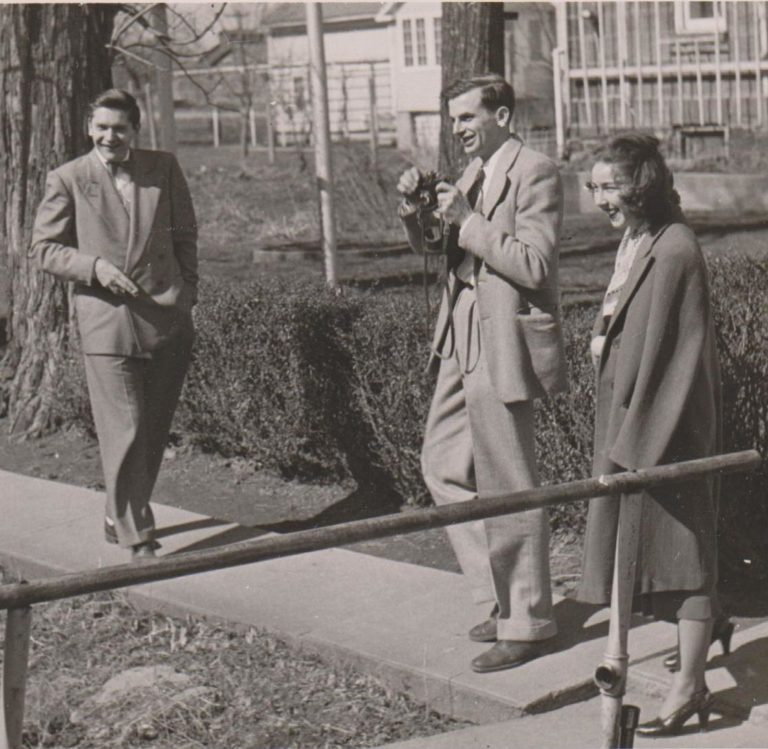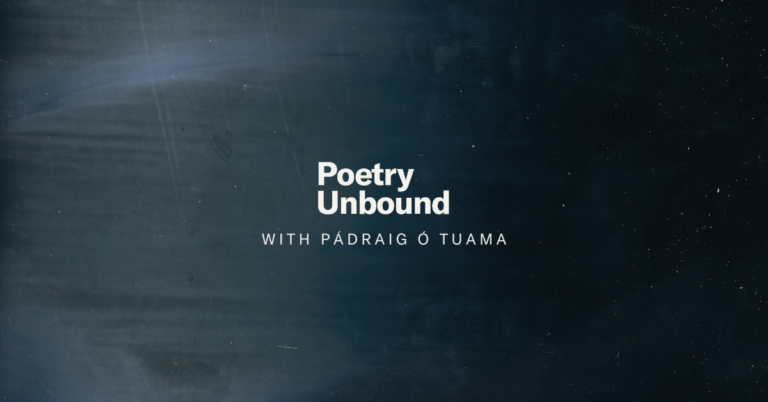
Flannery O'Connor, age 22, with Robie Macauley and Arthur Koestler at Amana Colonies in Iowa (October 9, 1947). Image by C. Cameron Macauley/Wikipedia (CC-BY-SA-3.0)..
Make Me a Mystic: The Profound Honesty of Flannery O’Connor
There’s a common emotional vocabulary in the writings of Catholic women, a fierce devotion strangely coupled with a startling humility. This is ever-so-present in Flannery O’Connor’s A Prayer Journal, recently published by Farrar, Straus, and Giroux.
It’s a wonderful book: unflinchingly honest, unfailingly wise, and immensely funny:
“What I am asking for is really very ridiculous. Oh Lord, I am saying, at present I am a cheese, make me a mystic, immediately. But then God can do that — make mystics out of cheeses.”
Ms. O’Connor wrote this collection of prayers — letters really — to God as a student attending the Iowa Writers’ Workshop in her twenties, around the time that her first short story was published in Accent magazine. She struggles with doubt and uncertainty, afraid that she will not produce another work worthy of publication, and asks God: “Please help me dear God to be a good writer and to get something else accepted.”
This desire, quickly couched in humility — “This is so far from what I deserve, of course” — is rare in autobiography. But then, this isn’t autobiography. I wonder if Flannery O’Connor ever intended for others to read this. This is Catholic writer at her most vulnerable, with her most selfish, most personal desires and doubts exposed.
In this way, A Prayer Journal feels modern. Stripped of the pretensions of writing for an audience, the prayers feel personal, relatable. She asks: “Perhaps the feeling I keep asking for, is something again selfish — something to help me feel that everything with me is all right.”
It is easy to forget that she is writing this in 1946, and not 2014. The desire to feel “good enough,” to be freed from the anxiety of success and transported to the domain of grace where talent and potential are meaningless, seems to belong to this current decade, not within Ms. O’Connor’s lifetime.
A Prayer Journal is a shining example of the power of confessional literature. Dorothy Day, another female Catholic writer, wrote:
“Going to confession is hard. Writing a book is hard, because you are ‘giving yourself away.’ But if you love, you want to give yourself. You write as you are impelled to write, about man and his problems, his relation to God and his fellows. You write about yourself because in the long run all man’s problems are the same, his human needs of sustenance and love.”
I don’t think Flannery O’Connor thought she was writing anything worthwhile in these journals, or at least, not worth publishing. But in their fragility, in their total, unedited lack of awareness of audience, they show a side of human nature that we don’t often get to see in our literary giants. In A Prayer Journal, Flannery O’Connor is most human — achingly, uncomfortably, startlingly.
A Prayer Journal is a glimpse into a human moment colored with doubt and fear, enamored by the light and grace that God represents, preoccupied by the mundane. Despite her best intentions, she gives us a portrait of ourselves — and permission to both feel and express life honestly, in its wholeness, without revision.

[…]* effort at artistry in this rather than thinking of You and feeling inspired with the love I wish I had.
Dear God, I cannot love Thee the way I want to. You are the slim crescent of a moon that I see and my self is the earth’s shadow that keeps me from seeing all the moon. The crescent is very beautiful and perhaps that is all one like I am should or could see; but what I am afraid of, dear God, is that my self shadow will grow so large that it blocks the whole moon, and that I will judge myself by the shadow that is nothing.
I do not know You God because I am in the way. Please help me to push myself aside.I want very much to succeed in the world with what I want to do. I have prayed to You about this with my mind and my nerves on it and strung my nerves into a tension over it and said, “oh God please,” and “I must,” and “please, please.” I have not asked You, I feel in the…”
*The opening pages of the journal appear to have been lost.

